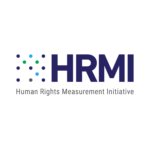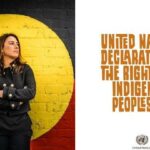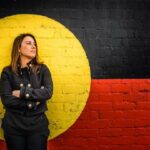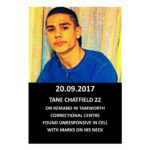The UN Human Rights Committee Finds Australia Violated Indigenous Peoples’ Land Rights
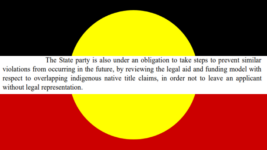
Weeks out from Australia holding a referendum on the Voice, an Indigenous advisory body to government, the UN Human Rights Committee (CCPR) has determined that our legal system has run roughshod over First Nations rights in a decision that happened to benefit mining interests.
The Wunna Nyiyaparli people are part of the larger Nyiyaparli people of WA’s eastern Pilbara region, whose territory covers the area known as the Roy Hill Pastoral Lease. The Wunna Nyiyaparli “speak for” or hold the rights over that land, under Western Desert traditional law and customs.
This parcel of land also happens to be rich in iron ore, with Andrew ‘Twiggy’ Forrest’s Forestque Metals Group operating the Christmas Creek and Cloudbreak mines on it, while Gina Rinehart runs the Roy Hill mine, one of the largest iron ore mines on the planet, within its borders.
The Wunna Nyiyaparli filed a 2019 complaint with the CCPR outlining that their 2012 native title claim was recognised, but as it conflicted with a wider claim of the Nyiyaparli, who were negotiating with mining companies, the dispute went to court, where they were locked out of proceedings.
The CCPR found that Australia did violate the human rights of the Wunna Nyiyaparli, under the International Covenant on Civil and Political Rights (ICCPR), and it’s requested our nation submit information on how it will provide them “an effective and enforceable remedy” within 180 days.
Erased by the court
“Essentially, what the Human Rights Committee is saying is that the Wunna Nyiyaparli never got a fair go in the procedure that was used and never properly had their day in court,” human rights lawyer Scott Calnan told Sydney Criminal Lawyers.
“The significance of this in a year when we are having a vote on an Indigenous Voice is that it’s about the inclusion of Indigenous people,” he continued. “They should be properly included like other people who go before the courts. They should have rights to legal representation and a fair day.”
The Wunna Nyiyaparli lodged their native title claim in January 2012, and it passed the registration test in sections 190B and 190C of the Native Title Act 1993 (Cth) in April. And the land it covers also sits within the region of the wider 1998 Nyiyaparli native title claim that was lodged by five people.
Some of the Nyiyaparli people involved in negotiating two Indigenous land use agreements (ILUAs) with mining interests under the 1998 claim, when the Wunna Nyiyaparli claim was lodged, disputed it, as the new claim would jeopardise these ILUAs, which were filed in July 2012.
The Federal Court then determined in 2015 that the dispute that had arisen due to the two native title claims was to be examined in court, and on top of that, it would also deliberate upon whether the Wunna Nyiyaparli were really Nyiyaparli people, despite their having passed the native title test.
In March 2016, the lawyers representing the Wunna Nyiyaparli dropped the case. And as the First Nations people could not afford new legal representation and were living on Country, their communications with the Federal Court became confused, disjointed or notifications weren’t even received.
The court went on to determine that initial proceedings would take place solely on the question of the Wunna Nyiyaparli people’s heritage.
But on reading the email notification about these proceedings, the Wunna Nyiyaparli people took the content of the message to mean that the heritage question had been resolved in their favour and the proceedings about to take place related to the two native title claims.
Three Wunna Nyiyaparli people were in court on 11 July 2016. But because they were prepared to argue their claim and not their heritage, Justice Richard White determined to proceed without their input, and went on to rule that they were not Nyiyaparli, which cancelled out their native title claim.
“The result,” Calnan added, “was that the Wunna Nyiyaparli had their claim dismissed without being able to put any submissions, without being able to put on the evidence they had for native title or being able to get together any evidence for” the question regarding their heritage.
International condemnation
In filing their native title claim, the Wunna Nyiyaparli were trying to prevent ongoing mining expansion on Country, as their identity is intimately linked to it. And they’d found that under the 1998 Nyiyaparli native title claim, they were being denied their ability to “speak for” that territory.
Wunna Nyiyaparli elder Ailsa Roy lodged the CCPR complaint on behalf of her people, and she emailed its decision to SCL. And despite the local radio silence on the finding with global implications, Roy noted that London-based Minority Rights Group International will soon be commenting on the determination.
Calnan explained that the CCPR found that the Wunna Nyiyaparli people’s basic human rights had been violated, principally, under article 27 of the ICCPR, which seeks to protect the cultural rights of minority groups, including Indigenous peoples.
The CCPR decision outlines that the Wunna Nyiyaparli argued that Australia has violated their cultural rights “due to the lack of effective participation in the judicial proceedings of determination of their lands rights, with a direct consequence in the loss of their traditional territory”.
Further, this violation occurred as Australia had attributed their land to another Indigenous group interested in mining concessions, “which would lead to the dissolution of their own culture” based on “their laws and customs” and would ultimately see “the destruction of the Wunna Nyiyaparli”.
Advancing First Nations justice
Calnan explained that this decision is of global significance as the CCPR rules on the rights of Indigenous people across the world, and it “breaks new ground, internationally, on the question of fair procedure in regard to Indigenous peoples’ rights to land”.
“There has never been a decision on an Australian native title issue,” the Sydney-based lawyer continued, “but also, there has never been a decision on what the proper human rights complaint procedure is for determining legal rights of Indigenous people to their traditional lands.”
Released a fortnight ago, the advanced and unedited copy of the CCPR decision is available prior to the final version on Calnan’s request, and, as the Australian government was presented with it at that same time, the 180 days it has to find “an effective and enforceable remedy” is now ticking over.
And while Australia is not bound to follow the directions of the UN Human Rights Committee, which is made up of independent experts that monitor nations that are a party to the ICCPR in regard to their compliance with it, the CCPR’s decisions are highly influential on the international stage.
In terms of the remedy the Wunna Nyiyaparli are seeking, which the CCPR is in agreement with, is that Australia should provide them with the opportunity to go back to court and prove their native title, with legal representation, and any destruction to land in the interim be compensated.
“The government goes on continuously about how it favours an internationally rules-based order, and, in relation to the Voice, how it favours justice for Indigenous communities in Australia,” the human rights lawyer said in conclusion.
“This decision is an opportunity for them to further a rules-based international order, and it’s a chance, in addition to the Voice, to make another step forward in the rights of Indigenous people.”



